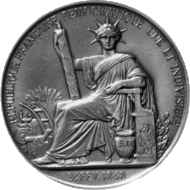François-Xavier Joseph de Casabianca
| François-Xavier Joseph de Casabianca | |
|---|---|
|
François, Count of Casabianca | |
| Born |
27 June 1796 Nice, France |
| Died |
24 May 1881 (aged 84) Paris, France |
| Nationality | French |
| Occupation | Lawyer and politician |
| Known for | Minister of the Second French Empire |
François-Xavier Joseph de Casabianca (27 June 1796 – 24 May 1881) was a French aristocrat, lawyer and politician who served as Minister of Agriculture and Commerce, Minister of Finance and then President of the Council of State in the government of Louis Napoleon.
Early years
François-Xavier Joseph de Casabianca was born in Nice, Alpes-Maritimes, on 27 June 1796.[1] His parents were François-Louis-Camille-Giocante de Casabianca (1776-1837) and Maria-Ilaria (1773-1835).[2] He came from an old noble family of Corsica that had contributed to the annexation of that island to France. He was the nephew of General Raphaël, Comte de Casabianca. His uncle had been created a Count of the Empire in 1806.[3]
Joseph de Casabianca obtained good grades at the lycée Napoléon, then studied law at the University of Paris. In 1820 he became a member of the bar of Bastia, in Corsica, and practiced as a lawyer until 1848. Since he was a Bonapartist, the government of King Louis Philippe I kept him away from public office.[1]
Representative and Minister
After the February Revolution, on 23 April 1848 de Casabianca was elected to the constituent assembly as representative of Corsica. He joined the majority and generally voted with the right. After the presidential election of 10 December 1848 he became one of the most zealous supporters of the President, Prince Louis Napoleon. He was reelected on 13 May 1849 as representative of Corsica in the legislative assembly. He continued to support the president, while joining the monarchist majority in votes. However, he abandoned the majority when conflict broke out with Louis Napoleon.[1]
On 26 October 1851 de Casabianca joined the cabinet as Minister of Agriculture and Commerce after the retirement of Léon Faucher. In the new cabinet General de Saint-Arnaud became minister of war. After a few weeks he became Minister of Finance, where he was at the time of the coup of 2 December 1851. When told by Louis-Napoleon of the planned coup the day before it took place, he refused on principle to participate and was temporarily relieved of office. On 22 January 1852 Casabianca was charged with organizing the new Ministry of State. He left office on 28 July 1852 and entered the senate, where he voted for the establishment of the Second French Empire, and continued to vote with the majority.[1]
Later years
By a decree of 5 March 1864 de Casabianca was named Attorney General at the Court of Accounts. During the Franco-Prussian War (19 July 1870 – 10 May 1871), on 4 September 1870 he returned to private life. He briefly returned to politics when he was elected on 14 May 1876 as deputy for the Bastia district. He sat on the right with the Appel au peuple party. He did not stand in the 1877 elections. Joseph de Casabianca was named a Grand Officer of the Legion of Honour in 1858. He died in Paris on 24 May 1881.[1]
References
Citations
- 1 2 3 4 5 Robert & Cougny 1889.
- ↑ Antonetti, Cardoni & Oliveira 2008, p. 331.
- ↑ Bachelin-Deflorenne 1887, p. 659.
Sources
- Antonetti, Guy; Cardoni, Fabien; Oliveira, Matthieu de (2008). "Les ministres des Finances de la Révolution française au Second Empire". ISBN 978-2-11-094808-3. Retrieved 2014-01-09.
|chapter=ignored (help) - Bachelin-Deflorenne, Antoine (1887). État présent de la noblesse française contenant le dictionnaire de la noblesse contemporaine et l'armorial général de France d'après les manuscrits de Ch. d'Hozier. libr. des bibliophiles.
- Robert, Adolphe; Cougny, Gaston (1889). "Xavier, François, Joseph DE CASABIANCA". Dictionnaire des parlementaires français de 1789 à 1889 (in French). National Assembly of France. Retrieved 2014-01-09.

-2.svg.png)